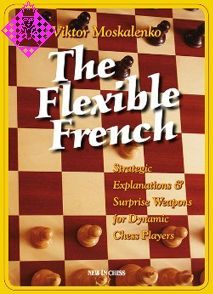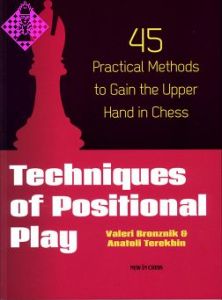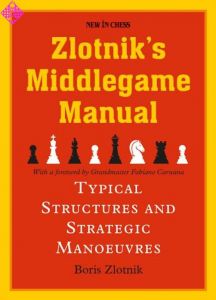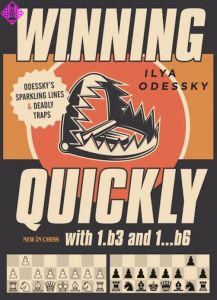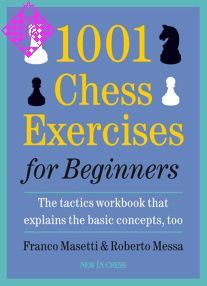Artikelnummer
LOMOSTFF
Autor
The Flexible French
279 Seiten, kartoniert, New in Chess, 1. Auflage 2008
Final vergriffen
The famous French Defence is one of the most widely-played chess openings. It is a fighting opening, which perfectly suits many club players as well as a growing number of top players.
The Flexible French is a revolutionary repertoire book for both Black and White. Viktor Moskalenko presents a wealth of original and dynamic options in every main line, proving that the French is a very lively and intriguing defence.
The Ukrainian grandmaster's analysis is high-level, yet his touch is light and fresh, and the book sparkles with original ideas. In his own inimitable style, Moskalenko gives the reader new gusto for the French.
This extremely accessible book rounds off with seven relatively unknown weapons, early deviations with which you may surprise your opponent - as Black or as White!
Original Variations for your Repertoire
Strategic Explanations and Surprise Weapons for Dynamic Chess Players
The French Defence is a gem in any chess player's opening repertoire. The main difference in comparison to other great openings is the display of knowledge and concepts that are required here, instead of a constant memorisation and repetition of long, forced, 'theoretical' lines. The middlegame and, with it, the real battle beat a very early stage.
This 'Flexible French' book is an attempt to mix various aspects: my general expein this opening, new concepts and analysis of several creative lines. Its puris to offer a combative repertoire to black players, and also to offer white players some sharp ideas.
With 1...e7-e6 Black builds a fortress with a closed centre, so the main roads to success are those leading to a game where White's extra tempo is not so important. This defence is also full of strategic as well as tactical resources, and according to many masters, its lines are among the most complicated in chess. There are also several forgotten systems that are still full of possibilities, sharp and exotic lines, original ideas and much more.
The current state of opening theory
During the past few years - the computer days - many books by vanguard authors have seen the light, with ambitious names like: 'Beating the Spanish, the Sicilian, the French' and many others. Some authors even churn out books of this type up to 3-5 times a year!
Please note that the Grand Masters, such as Botvinnik, Petrosian and also the best modern players, work on the study of their systems much more slowly, but with great depth - learning and practicing them year after year. The evaluations of their ideas hardly change, at least not as abruptly as in these new books.
Also, I think that a new time has arrived for chess books on opening theory. Inof copying thousands of games that are played each day and presenting the analysis by the engines, it is much more effective - and more positive - to compose a book with articles according to a different concept: with space for background information, an instructive selection of the material and conclusions drawn from this material.
The reader of The Flexible French will find it the easiest and the most interesting to learn the main plans with the following structure in each Part:
·Historic origin of each variation
·Main ideas, resources, advices
·Analysis of the most interesting lines through model games
·Illustrative games
·Statistics, summaries and conclusions.
I hope that my previous book The Fabulous Budapest Gambit and the present work can serve as good examples of this new method of writing opening books.
Of course, many questions will always remain open, for practical players as well as theoreticians.
Good luck with the study and the practice of a genuine opening - The French De
Grandmaster Viktor Moskalenko, Barcelona 2008
The Flexible French is a revolutionary repertoire book for both Black and White. Viktor Moskalenko presents a wealth of original and dynamic options in every main line, proving that the French is a very lively and intriguing defence.
The Ukrainian grandmaster's analysis is high-level, yet his touch is light and fresh, and the book sparkles with original ideas. In his own inimitable style, Moskalenko gives the reader new gusto for the French.
This extremely accessible book rounds off with seven relatively unknown weapons, early deviations with which you may surprise your opponent - as Black or as White!
Original Variations for your Repertoire
Strategic Explanations and Surprise Weapons for Dynamic Chess Players
The French Defence is a gem in any chess player's opening repertoire. The main difference in comparison to other great openings is the display of knowledge and concepts that are required here, instead of a constant memorisation and repetition of long, forced, 'theoretical' lines. The middlegame and, with it, the real battle beat a very early stage.
This 'Flexible French' book is an attempt to mix various aspects: my general expein this opening, new concepts and analysis of several creative lines. Its puris to offer a combative repertoire to black players, and also to offer white players some sharp ideas.
With 1...e7-e6 Black builds a fortress with a closed centre, so the main roads to success are those leading to a game where White's extra tempo is not so important. This defence is also full of strategic as well as tactical resources, and according to many masters, its lines are among the most complicated in chess. There are also several forgotten systems that are still full of possibilities, sharp and exotic lines, original ideas and much more.
The current state of opening theory
During the past few years - the computer days - many books by vanguard authors have seen the light, with ambitious names like: 'Beating the Spanish, the Sicilian, the French' and many others. Some authors even churn out books of this type up to 3-5 times a year!
Please note that the Grand Masters, such as Botvinnik, Petrosian and also the best modern players, work on the study of their systems much more slowly, but with great depth - learning and practicing them year after year. The evaluations of their ideas hardly change, at least not as abruptly as in these new books.
Also, I think that a new time has arrived for chess books on opening theory. Inof copying thousands of games that are played each day and presenting the analysis by the engines, it is much more effective - and more positive - to compose a book with articles according to a different concept: with space for background information, an instructive selection of the material and conclusions drawn from this material.
The reader of The Flexible French will find it the easiest and the most interesting to learn the main plans with the following structure in each Part:
·Historic origin of each variation
·Main ideas, resources, advices
·Analysis of the most interesting lines through model games
·Illustrative games
·Statistics, summaries and conclusions.
I hope that my previous book The Fabulous Budapest Gambit and the present work can serve as good examples of this new method of writing opening books.
Of course, many questions will always remain open, for practical players as well as theoreticians.
Good luck with the study and the practice of a genuine opening - The French De
Grandmaster Viktor Moskalenko, Barcelona 2008
| EAN | 9789056912451 |
|---|---|
| Gewicht | 570 g |
| Hersteller | New in Chess |
| Breite | 17 cm |
| Höhe | 23,5 cm |
| Medium | Buch |
| Erscheinungsjahr | 2008 |
| Autor | Viktor Moskalenko |
| Sprache | Englisch |
| Auflage | 1 |
| ISBN-13 | 9789056912451 |
| Seiten | 279 |
| Einband | kartoniert |
007 Foreword
009 Part One - The Black Queen's Musketeers
Advance Variation - 1.e4 e6 2.d4 d5 3.e5
011 Chapter 1 - Looking for Satisfaction
027 Chapter 2 - Labyrinths of the Old System
059 Part Two - Weapons and Dogmas
Tarrasch Variation - 1.e4 e6 2.d4 d5 3.Nd2
061 Chapter 3 - Beyond Tarrasch
110 Chapter 4 - Exotic Deviations
149 Part Three - French Magic
Classical System - 1.e4 e6 2.d4 d5 3.Nc3 Nf6
150 Chapter 5 - Morozevich's Resources
164 Chapter 6 - A Legendary Pin
192 Chapter 7 - Russian Roulette
211 Part Four - Behind the Barricades
Winawer Variation - 1.e4 e6 2.d4 d5 3.Nc3 Bb4
213 Chapter 8 - My System in the Winawer
221 Chapter 9 - Black Queen Blues: Winawer Variation
245 Part Five - Seven Samurai Swords
246 Chapter 10 - Kortchnoi's Wedge
249 Chapter 11 - King's Indian Attack
253 Chapter 12 - The Kung Fu Fight
256 Chapter 13 - Weathering the Storm
260 Chapter 14 - The Anti-Winawer
263 Chapter 15 - The Semi-Winawer
266 Chapter 16 - The Old Winawer
270 New In Chess Code System
271 Index of Variations
277 Index of Players
279 A Brief Biography of the Author/Bibliography
009 Part One - The Black Queen's Musketeers
Advance Variation - 1.e4 e6 2.d4 d5 3.e5
011 Chapter 1 - Looking for Satisfaction
027 Chapter 2 - Labyrinths of the Old System
059 Part Two - Weapons and Dogmas
Tarrasch Variation - 1.e4 e6 2.d4 d5 3.Nd2
061 Chapter 3 - Beyond Tarrasch
110 Chapter 4 - Exotic Deviations
149 Part Three - French Magic
Classical System - 1.e4 e6 2.d4 d5 3.Nc3 Nf6
150 Chapter 5 - Morozevich's Resources
164 Chapter 6 - A Legendary Pin
192 Chapter 7 - Russian Roulette
211 Part Four - Behind the Barricades
Winawer Variation - 1.e4 e6 2.d4 d5 3.Nc3 Bb4
213 Chapter 8 - My System in the Winawer
221 Chapter 9 - Black Queen Blues: Winawer Variation
245 Part Five - Seven Samurai Swords
246 Chapter 10 - Kortchnoi's Wedge
249 Chapter 11 - King's Indian Attack
253 Chapter 12 - The Kung Fu Fight
256 Chapter 13 - Weathering the Storm
260 Chapter 14 - The Anti-Winawer
263 Chapter 15 - The Semi-Winawer
266 Chapter 16 - The Old Winawer
270 New In Chess Code System
271 Index of Variations
277 Index of Players
279 A Brief Biography of the Author/Bibliography
GM Viktor Moskalenko hatte vor einiger Zeit mit seinem Erstlingswerk über das Budapester Gambit bereits positiv überrascht, diesmal widmet er sich der Französischen Verteidigung. „The Flexible French”, erschienen im New in Chess Verlag, verspricht laut Buchrücken ein revolutionäres Repertoirebuch für Weiß und Schwarz. Da der ukrainische Topgroßmeister und ehemalige Trainer von Ivanchuk diese Eröffnung selbst aktiv und erfolgreich mit Schwarz spielt, verwundert es nicht, wenn seine Sympathien mehr auf Seitens des Nachziehenden liegen, doch Moskalenko hat sich den Titel des Buches zu Herzen genommen und zeigt sich, für Schachbuchautoren eher ungewöhnlich, recht flexibel und zeigt auch mit den weißen Steinen gefährliche Varianten. Aber um was geht es eigentlich genau bei diesem sehr ungewöhnlichen Eröffnungsbuch? Moskalenko stellt mehrere verschiedene Varianten aus dem Bereich der französischen Verteidigung vor, dabei geht er auf die Geschichte der Variante ein, bespricht strategische und taktische Besonderheiten und liefert dazu noch einige statistische Fakten. Was dieses Buch aber zu etwas Besonderen macht ist der Umstand, dass für beide Seiten ein Repertoire geboten wird, gespickt mit überraschenden Varianten und giftigen Zügen, ähnlich der Art, wie es auch die SOS-Reihe praktiziert. Behandelt werden die Systeme 1.e4 e6 2.d4 d5 3.Sc3 Lb4/Sf6, 3.Sd2, die Vorstoßvariante 3.e5 und Abweichungen oder selten gespielte Systeme wie der Königsindische Angriff, das Gambit 2.Sf3 d5 3.e5 c5 4.b4!? und Abtauschvariante. Im Kapitel „Seven Samurai Swords” werden diverse Varianten behandelt, die als Überraschungswaffen für beide Seiten angewendet werden können. Die Analysen und Varianten sind in 75 Partien verpackt worden, die meisten davon vom Autor selbst gespielt, sie dienen als Musterpartien und liefern wertvolle Ideen und Strategien für das eigene Spiel. Zu den Überraschungswaffen will ich nicht zuviel verraten nur soviel: Vor einiger Zeit erschien „The French” von John Watson, ein Buch mit sehr vielen originellen Ideen und Analysen zu dieser Eröffnung, in der SOS-Reihe erschienen bereits auch mehrere Beiträge zu seltenen französischen Varianten. Moskalenko´s Buch vereint meiner Meinung nach diese Beiträge zu einem Ganzen und liefert darüber hinaus noch viele weitere Überraschungen und Ideen aus dem reichen Erfahrungsschatz des Autors. Ein kleines Beispiel aus dem Buch: Das Gambit 1.e4 e6 2.Sf3 d5 3.e5 c5 4.b4!? hat schon so manchen Französischanhänger gewaltige Kopfschmerzen bereitet, was schlägt Moskalenko dagegen vor? Die Antwort lautet 4…d4! 5.bxc5 Lxc5 6.La3 Da5 7.Lxc5 Dxc5 8.c3 Sc6 9.cxd4 Sxd4 10.Da4 Ld7!!, nachfolgende Analyse im Buch endet mit Vorteil für Schwarz.
Die Analysen sind, wie von Moskalenko gewohnt, absolut präzise und bringen das Wesentliche und Wichtige zum Vorschein, dazu gesellen sich umfangreiche Erklärungen und Hinweise zum Gebrauch dieser Eröffnung. Das Buch bietet keinen kompletten Überblick über die aktuelle Theorie des Franzosen sondern bietet für beide Seiten interessante Wege und Alternativen.
Fazit:
Moskalenko bleibt seiner Linie treu und schreibt weiterhin sehr gute Eröffnungsbücher!
„The Flexible French” bietet hilfreiche und wertvolle Analysen um das eigene Repertoire zu erweitern, nebenbei lernt man anhand der Partien, wie man Französisch wirklich gut spielt. Wer Französisch im Repertoire hat, wer Französisch lernen will, wer seinen nächsten Gegner gehörig überraschen will und/oder einfach nur etwas lernen will von einem Experten dieser Eröffnung, dem kann ich dieses Buch nur wärmstens empfehlen!
Mit freundlicher Genehmigung
Martin Rieger, www.freechess.info, Juli 2008
Die Analysen sind, wie von Moskalenko gewohnt, absolut präzise und bringen das Wesentliche und Wichtige zum Vorschein, dazu gesellen sich umfangreiche Erklärungen und Hinweise zum Gebrauch dieser Eröffnung. Das Buch bietet keinen kompletten Überblick über die aktuelle Theorie des Franzosen sondern bietet für beide Seiten interessante Wege und Alternativen.
Fazit:
Moskalenko bleibt seiner Linie treu und schreibt weiterhin sehr gute Eröffnungsbücher!
„The Flexible French” bietet hilfreiche und wertvolle Analysen um das eigene Repertoire zu erweitern, nebenbei lernt man anhand der Partien, wie man Französisch wirklich gut spielt. Wer Französisch im Repertoire hat, wer Französisch lernen will, wer seinen nächsten Gegner gehörig überraschen will und/oder einfach nur etwas lernen will von einem Experten dieser Eröffnung, dem kann ich dieses Buch nur wärmstens empfehlen!
Mit freundlicher Genehmigung
Martin Rieger, www.freechess.info, Juli 2008
Mehr von New in Chess

